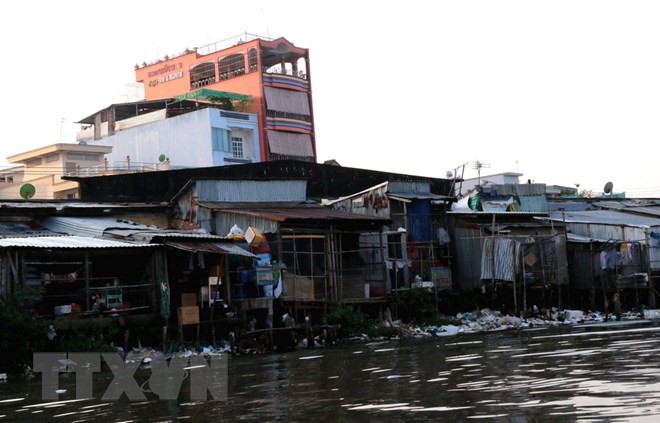 Environment
Environment

The southernmost province of Cà Mau is taking preventive measures to manage pollution hotspots at industrial zones and clusters, intensive shrimp-farming establishments, and aquaculture processing facilities.
 |
| A section of a river in the southernmost province of Cà Mau has been seriously polluted by wastewater discharged by industries and households in the area. — VNA/VNS Photo Kim Há |
CÀ MAU — The southernmost province of Cà Mau is taking preventive measures to manage pollution hotspots at industrial zones and clusters, intensive shrimp-farming establishments, and aquaculture processing facilities.
Cà Mau City’s rivers and canals are being seriously polluted by wastewater discharged by industries and households.
Aquatic product processing establishments are discharging untreated water, while nine units in the Hòa Trung Industrial Zone in Cái Nước District are generating waste gas, wastewater and bad odours, leading to complaints from nearby residents.
At the Sông Đốc Industrial Cluster and a contiguous area in Trần Văn Thời District, 12 industrial production establishments, including three seafood processing plants and nine fishmeal production establishments, are polluting the water and surrounding environment with dust and bad odours.
Pollution levels around and in industrial zones have worsened because of fishmeal processing of rice husks and small-scale fishery establishments. Many of these facilities are located along rivers and have no centralised wastewater treatment systems.
Solutions
Trịnh Văn Lên, director of the province’s Department of Natural Resources and Environment, said the province was taking steps to prevent pollution to enable green growth and sustainable development.
Last year, the province fined many local firms a total of more than VNĐ650 million (US$28,555) for violations related to environmental and water protection.
Lên said the department would improve local government’s supervision and inspection responsibilities related to environmental protection.
All households have been encouraged to sign commitments by the end of May to maintain environmental sanitation and not throw waste into rivers and canals, according to Lên.
In addition, more inspections will be scheduled at pollution hotspots, and surveillance cameras will be installed in public areas.
Two teams of staff who will oversee environmental protection activities in Cà Mau City have also been established.
At Hòa Trung Industrial Zone, the province’s People’s Committee has assigned the Department of Natural Resources and Environment to work with other agencies to identify polluting facilities.
Production facilities have also been required to install emissions and wastewater treatment systems by the end of the year.
By the end of June, they must install surveillance cameras and electronic metres to transmit data to the Natural Resources and Environment Department for analysis.
At the Sông Đốc Industrial Cluster, the province is calling for investment in construction of infrastructure projects covering a 100ha area.
By the end of May 2018, the Department of Natural Resources and Environment plans to provide technical guidance to facilities using rice husk boilers to ensure they are following national environmental standards.
If production establishments do not meet requirements by the end of the year, their operations would be suspended, the department said. — VNS




